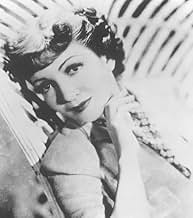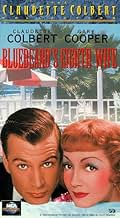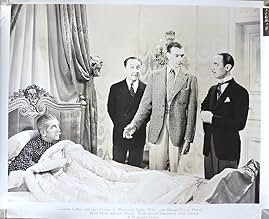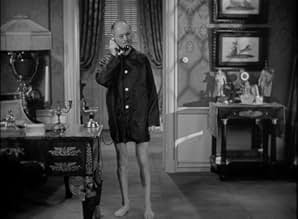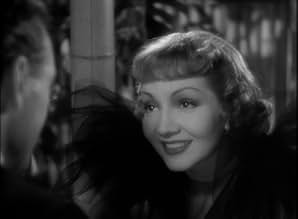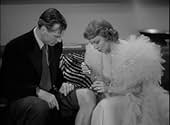IMDb-BEWERTUNG
7,1/10
5023
IHRE BEWERTUNG
Füge eine Handlung in deiner Sprache hinzuAfter learning her multi-millionaire fiancé has already been married seven times, the daughter of a penniless marquis decides to tame him.After learning her multi-millionaire fiancé has already been married seven times, the daughter of a penniless marquis decides to tame him.After learning her multi-millionaire fiancé has already been married seven times, the daughter of a penniless marquis decides to tame him.
- Auszeichnungen
- 2 wins total
Mariska Aldrich
- Nurse at Door
- (Nicht genannt)
Leon Ames
- Ex-Chauffeur
- (Nicht genannt)
Lenore Aubert
- Party Guest
- (Nicht genannt)
Eugene Borden
- Waiter on the Stairs
- (Nicht genannt)
Barlowe Borland
- Uncle Fernandel
- (Nicht genannt)
Empfohlene Bewertungen
Oh Lubitsch how we needed you. Others could elicit fiery performances from actors, captivate with riveting story or lavish us with sets and camera magic. These usually require to be propped up with some effort, but what Lubitsch does simply requires letting go of, in particular letting go of our need to prop up fiction a certain way.
Usually understood as a gift for wit, his famed 'Lubitsch touch' is actually a mastery of something else, spontaneous illogicality. I have written about him in a few other posts so will not bore you here. It's the continuous shift of context, the dismantling of our expectation that story plays out a certain way.
The story could be anything, here a man and woman court each other while vacationing in the French Riviera. He's the blustering American type who won't take no and won't tiptoe around European niceties. She's elegant and smart but will not stoop to be wowed by money like her shyster father.
In the usual mode, they would brush and bounce off each other whilst trying to top each other for control over the story. This as hardwon love that surprises. That's fine, plenty of enjoyable films were being made in this time, what we now know as screwball. For me it's all a matter of how we brush, how much narrative space the players create by pushing and pulling, in which self can take shape, actual visible shape, as the story we watch. Capra has a very agile touch in It Happened One Night. I happen to find His Girl Friday coarse, par the course for Hawks.
In Lubitsch's world, we shift and shift again in a jazz merry-go-round of elusive self. Here's some of it. They meet as strangers in a store, cooperating over trying to buy pyjamas. He decides he's smitten, but uses money to come close to her. So what happens? She agrees to be bought as a wife but gives him a thankless marriage for it, although in love herself.
This is lovely work, clean, vibrant. Some if are just gags, like having married seven times before her. But quite a bit of it is that wondrous surprise where emotions express themselves in paradoxical ways.
Usually understood as a gift for wit, his famed 'Lubitsch touch' is actually a mastery of something else, spontaneous illogicality. I have written about him in a few other posts so will not bore you here. It's the continuous shift of context, the dismantling of our expectation that story plays out a certain way.
The story could be anything, here a man and woman court each other while vacationing in the French Riviera. He's the blustering American type who won't take no and won't tiptoe around European niceties. She's elegant and smart but will not stoop to be wowed by money like her shyster father.
In the usual mode, they would brush and bounce off each other whilst trying to top each other for control over the story. This as hardwon love that surprises. That's fine, plenty of enjoyable films were being made in this time, what we now know as screwball. For me it's all a matter of how we brush, how much narrative space the players create by pushing and pulling, in which self can take shape, actual visible shape, as the story we watch. Capra has a very agile touch in It Happened One Night. I happen to find His Girl Friday coarse, par the course for Hawks.
In Lubitsch's world, we shift and shift again in a jazz merry-go-round of elusive self. Here's some of it. They meet as strangers in a store, cooperating over trying to buy pyjamas. He decides he's smitten, but uses money to come close to her. So what happens? She agrees to be bought as a wife but gives him a thankless marriage for it, although in love herself.
This is lovely work, clean, vibrant. Some if are just gags, like having married seven times before her. But quite a bit of it is that wondrous surprise where emotions express themselves in paradoxical ways.
I have to agree with other reviews I've seen of this movie - despite some funny scenes and good lines, as a whole it just doesn't get off the ground, and Gary Cooper is wrong in the role of the much-married millionaire. Having said that, I love the scene where Claudette Colbert's character, talking about her financial difficulties, says: "Have you ever had a waiter look at you with untipped eyes? And when I ask the elevator boy for the fourth floor, he says 'Yes, Madame' and takes a detour through the basement." A small detail: in one scene Colbert is looking at a book called "Live Alone and Like It" which was an actual best-seller at the time.
'Absolutely delightful' sounds a bit twee doesn't it? The mid-thirties were awash with so-called 'sophisticated comedies' all pretty bland and predictable. This however has something special about it. It's not quite a laugh out loud comedy but it's genuinely charming and guaranteed to leave you a happier person.
What makes this a class above most offerings from 1938 is that you can't help loving the characters. Clearly it's easy to fall in love with Claudette Colbert but Gary Cooper's millionaire is surprisingly endearing too. He was excellent in the brilliant comedy BALL OF FIRE with Barbara Stanwyck but because you associate Gary Cooper with stoic, serious roles, when he's in a comedy, a genuinely funny comedy and he is genuinely funny himself, it really makes an impression. He's still every inch, the man's man but also oblivious to the ways of the fairer sex. That he tries to learn about how to treat troublesome women by reading The Taming of the Shrew is a classic piece of comedy.
Lubitsch was the undisputed master at making a simple battle of the sexes movies witty, loading it with sexual frustration and innuendo whilst still making it utterly charming.....but this was no simple battle of the sexes movie - this was written by Charles Bracket and Billy Wilder so Lubitsch didn't have to try too hard. Like any good comedy, the humour comes from your belief in the realness of the characters and this is such a well crafted 'rom com' that you're completely drawn into this silly but lovely picture. When it ends, you are smiling and you feel like applauding!
And of course, Claudette Colbert looks like a goddess!
What makes this a class above most offerings from 1938 is that you can't help loving the characters. Clearly it's easy to fall in love with Claudette Colbert but Gary Cooper's millionaire is surprisingly endearing too. He was excellent in the brilliant comedy BALL OF FIRE with Barbara Stanwyck but because you associate Gary Cooper with stoic, serious roles, when he's in a comedy, a genuinely funny comedy and he is genuinely funny himself, it really makes an impression. He's still every inch, the man's man but also oblivious to the ways of the fairer sex. That he tries to learn about how to treat troublesome women by reading The Taming of the Shrew is a classic piece of comedy.
Lubitsch was the undisputed master at making a simple battle of the sexes movies witty, loading it with sexual frustration and innuendo whilst still making it utterly charming.....but this was no simple battle of the sexes movie - this was written by Charles Bracket and Billy Wilder so Lubitsch didn't have to try too hard. Like any good comedy, the humour comes from your belief in the realness of the characters and this is such a well crafted 'rom com' that you're completely drawn into this silly but lovely picture. When it ends, you are smiling and you feel like applauding!
And of course, Claudette Colbert looks like a goddess!
There is something about seeing a movie in a good, old-fashioned movie house that adds enormous appeal to every picture. I, fortunately enough, was able to see at Film Forum in New York City a pair of Ernst Lubitsch comedies during their three week tribute to the legendary director. The double feature I attended was a screening of Lubitsch's 1938 comedy Bluebeard's Eighth Wife and the pre-Code classic Design for Living, neither of which I had seen before. Everything I read of Design for Living praised the film, but I could not find a good review anywhere for Bluebeard's Eighth Wife. Leonard Maltin disliked it.VideoHound, too, gave the comedy a low rating.its IMDB score was not complimentary.and Pauline Kael (not a great surprise) blasted the film in her scathing review. So, when I went into the city that day I was expecting to enjoy Bluebeard's Eighth Wife only slightly and love Design for Living completely. Bluebeard's Eighth Wife (which was showing first) began, as the eccentrics who populate the cinema took their seats and the thirties music subsided. `Adolph Zukor presents Claudette Colbert and Gary Cooper in Ernst Lubitsch's Bluebeard's Eighth Wife,' the title card read. Then the picture opened with a hilarious scene: Cooper wants to buy a pair of pajama tops, but he doesn't want any part of the bottoms! He gets into a squabble with the clerk, who seeks the help of his higher bosses, and their seems to be no end to the argument. Enter Claudette Colbert, one of thirties cinema's most beautiful, charming, and talented personalities. `I'll take the bottom,' she kindly intercedes. And there you have perhaps screwball comedies finest `meet cute' ever. The film kept my interest wonderfully.I found myself laughing almost constantly. When Colbert discovers, just before a family portrait is taken, that her groom-to-be has been married seven times, the entire theatre broke into histerics. When she bargains for money immediately after she gets over her shock, the laughs (which still haven't ceased) intensify. And Edward Everett Horton milked some hilarious reactions out of the script as well. When Cooper takes inspiration from Shakespeare's The Taming of the Shrew in disciplining his wife by slapping her in the face, I could not control my laughter when she slapped him back. And the drunk scene with the scallions is one of Claudette Colbert's funniest comic scenes. The greatest comic moment of the film came when Colbert highers a boxer to `teach her husband a lesson.' In pure screwball fashion, he knocks out the wrong man, instead putting her friend David Niven into a cold sleep. He awakes as Cooper is arriving. In order to cover up the situation, Colbert herself, in a moment of strong sexiness, puts her fist up to Niven, asks: `Where did that man hit you? Here? Right here? Right here?' and then BAM! knocks him out again! The film was wonderful, from beginning to end it was a perfect delight. I loved Design for Living, too, though I dare say I think for sheer laughs and entertainment Bluebeard's Eighth Wife was the better and more enjoyable film. There is some charm of seeing a vintage film on the large screen. And in the presence of others laughing, one feels more comfortable doing so himself. That is, perhaps, why I felt the way I did about Bluebeard's Eighth Wife.
It starts in the French Riviera at a dressing department store where an elegant man wants to buy pyjama tops and a woman the bottoms . He is the US multi-millionaire Michael Brandon (Gary Cooper, though miscast , at times ) who tries to marry his eight wife , called Nicole (Claudette Colbert is fine as the beautiful girl who aims to be his eighth) . After learning her multi-millionaire fiancé has already been married seven times , Nicole , daughter of a bankrupted French Marquis (Edward Everett Horton) attempts to tame the egoistic man and he then ends at an asylum . He married in haste and repeated in pleasure!
Problematic comedy and sporadically fun , set in the French Riviera about a spoiled millionaire who attempts to marry the daughter of a penniless marquis , she then decides to control him , as she doesn't want to be only a number in the row of his ex-wives and starts her own strategy to "tame" him . Good for a few laughs , based on the play by Alfred Savoir and American version by Charlton Andrews with a diverting script by prestigious Charles Brackett and Billy Wilder , though providing a wrong sort of discomfort to the closing scenes at a lunatic sanatorium . Adding some scenes justifying Ernst Lubitsch's reputation for his famous ¨Touch¨ , along with adequate as well as evocative musical score by Frederick Hollander . This Lubitsch romp contains a very good main and support cast . Gary Cooper is nice as the millionaire who who can handle money but not wives , as he has a comeuppance coming up from the eighth , though Coop seems out of place as a playboy . Claudette Colbert is perfect as the woman who aims to be his eighth and she then tries to tame him. There's astringent and typecast secondary cast from sympathetic Edward Everett Horton as the broken Marquis De Loiselle , delightful David Niven as Albert De Regnier , Elizabeth Patterson as Aunt Hedwige , Herman Bing as Monsieur Pepinard , Warren Hymer as Kid Mulligan and Franklin Pangborn as snooty Assistant Hotel Manager
The motion picture well photographed by Leo Tover was competently made by master filmmaker Ernst Lubitsch ,though softening the script's acidity, and he had previously directed Gary Cooper in Design for life . Lubitsch was a maestro director of naughty but entertaining comedies who had lots of successes . Lubitsch's breakthrough film came in 1918 with "The Eyes of the Mummy", a tragedy starring future Hollywood star Pola Negri. Also that year he made Carmen (1918), again with Negri, a film that was commercially successful on the international level. His work already showed his genius for catching the eye as well as the ear in not only comedy but historical drama. The year 1919 found Lubitsch directing seven films, the two standouts being his lavish Madame DuBarry (1919) with two of his favorite actors--Negri (yet again) and Emil Jannings. His other standout was the witty parody of the American upper crust, "The Oyster Princess" 1919 . This film was a perfect example of what became known as the Lubitsch styl e, or the "Lubitsch Touch", as it became known--sophisticated humor combined with inspired staging that economically presented a visual synopsis of storyline, scenes and characters. Lubitsch directed a lot of comedies and vintage movies , such as : ¨Heaven can wait¨, ¨That uncertain feeling¨, ¨Ninotchka¨, ¨Bluebeard's eight wife¨, ¨Angel¨, ¨The merry widow¨, ¨The Student Prince¨, ¨So this is Paris¨, ¨Lady Windermere's fan¨, ¨The marriage circle¨, ¨One Arabian night¨, ¨Passion¨, ¨Gypsy blood¨, among others . Rating : 7/10 . Better than average .
Problematic comedy and sporadically fun , set in the French Riviera about a spoiled millionaire who attempts to marry the daughter of a penniless marquis , she then decides to control him , as she doesn't want to be only a number in the row of his ex-wives and starts her own strategy to "tame" him . Good for a few laughs , based on the play by Alfred Savoir and American version by Charlton Andrews with a diverting script by prestigious Charles Brackett and Billy Wilder , though providing a wrong sort of discomfort to the closing scenes at a lunatic sanatorium . Adding some scenes justifying Ernst Lubitsch's reputation for his famous ¨Touch¨ , along with adequate as well as evocative musical score by Frederick Hollander . This Lubitsch romp contains a very good main and support cast . Gary Cooper is nice as the millionaire who who can handle money but not wives , as he has a comeuppance coming up from the eighth , though Coop seems out of place as a playboy . Claudette Colbert is perfect as the woman who aims to be his eighth and she then tries to tame him. There's astringent and typecast secondary cast from sympathetic Edward Everett Horton as the broken Marquis De Loiselle , delightful David Niven as Albert De Regnier , Elizabeth Patterson as Aunt Hedwige , Herman Bing as Monsieur Pepinard , Warren Hymer as Kid Mulligan and Franklin Pangborn as snooty Assistant Hotel Manager
The motion picture well photographed by Leo Tover was competently made by master filmmaker Ernst Lubitsch ,though softening the script's acidity, and he had previously directed Gary Cooper in Design for life . Lubitsch was a maestro director of naughty but entertaining comedies who had lots of successes . Lubitsch's breakthrough film came in 1918 with "The Eyes of the Mummy", a tragedy starring future Hollywood star Pola Negri. Also that year he made Carmen (1918), again with Negri, a film that was commercially successful on the international level. His work already showed his genius for catching the eye as well as the ear in not only comedy but historical drama. The year 1919 found Lubitsch directing seven films, the two standouts being his lavish Madame DuBarry (1919) with two of his favorite actors--Negri (yet again) and Emil Jannings. His other standout was the witty parody of the American upper crust, "The Oyster Princess" 1919 . This film was a perfect example of what became known as the Lubitsch styl e, or the "Lubitsch Touch", as it became known--sophisticated humor combined with inspired staging that economically presented a visual synopsis of storyline, scenes and characters. Lubitsch directed a lot of comedies and vintage movies , such as : ¨Heaven can wait¨, ¨That uncertain feeling¨, ¨Ninotchka¨, ¨Bluebeard's eight wife¨, ¨Angel¨, ¨The merry widow¨, ¨The Student Prince¨, ¨So this is Paris¨, ¨Lady Windermere's fan¨, ¨The marriage circle¨, ¨One Arabian night¨, ¨Passion¨, ¨Gypsy blood¨, among others . Rating : 7/10 . Better than average .
Wusstest du schon
- WissenswertesThis was the first collaboration of director Ernst Lubitsch with writers Charles Brackett and Billy Wilder. At their first production meeting, Lubitsch posed this question: "How do the boy and girl get together?". Wilder promptly suggested that the opening scene should be in the men's shop of a department store. "The boy is trying to buy a pajama," he extemporized, "but he sleeps only in the tops. He is thrifty so he insists on buying ONLY the tops. The clerk says he must buy the pants, too. It looks like a catastrophe. Then the girl comes into the shop and buys the pants because she sleeps only in the pants." Lubitsch and Brackett were enchanted with this idea. Months later, they discovered that Wilder himself was a pajama tops-only sleeper and had been contemplating this idea for months, waiting for a chance to use it in a comedy.
- PatzerWhen Nicole shuts the door to her part of the apartment to keep Michael out, the door can be heard being locked. However, there is no keyhole or lock visible on either side of the door.
- Zitate
Nicole de Loiselle: [sarcastically] Mr. Brandon, you're terrific. You're gigantic! You're - you're breathtaking. I wish someone would tell you what I really think of you.
- VerbindungenFeatured in The Great Canadian Supercut (2017)
- SoundtracksHere Comes Cookie
(1935) (uncredited)
Music and Lyrics by Mack Gordon
Performed by Gary Cooper (vocal and piano)
Top-Auswahl
Melde dich zum Bewerten an und greife auf die Watchlist für personalisierte Empfehlungen zu.
- How long is Bluebeard's Eighth Wife?Powered by Alexa
Details
- Erscheinungsdatum
- Herkunftsland
- Sprachen
- Auch bekannt als
- Bluebeard's Eighth Wife
- Drehorte
- Produktionsfirma
- Weitere beteiligte Unternehmen bei IMDbPro anzeigen
Box Office
- Budget
- 1.300.000 $ (geschätzt)
- Laufzeit1 Stunde 25 Minuten
- Farbe
- Seitenverhältnis
- 1.37 : 1
Zu dieser Seite beitragen
Bearbeitung vorschlagen oder fehlenden Inhalt hinzufügen

Oberste Lücke
By what name was Blaubarts achte Frau (1938) officially released in India in English?
Antwort

